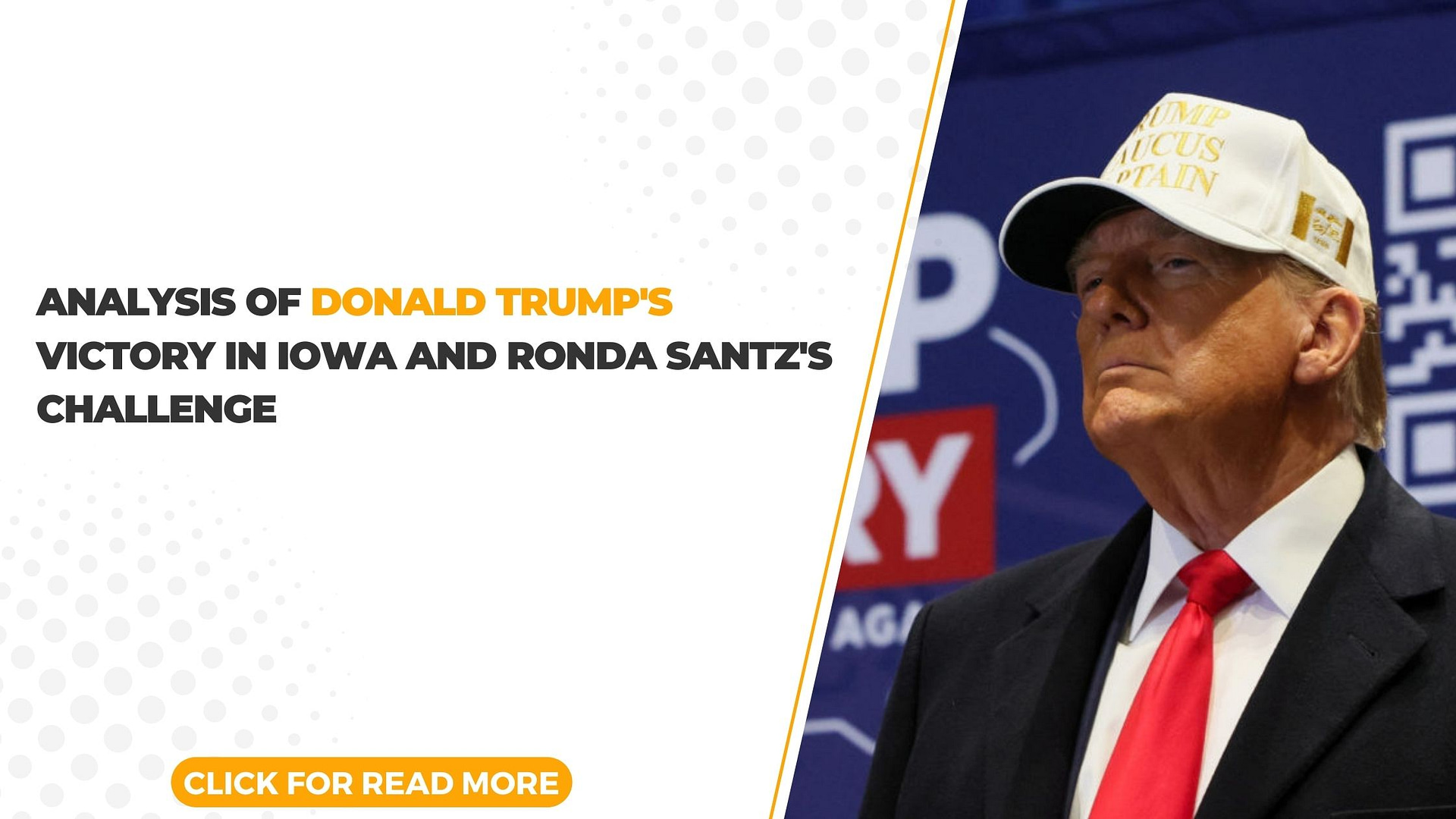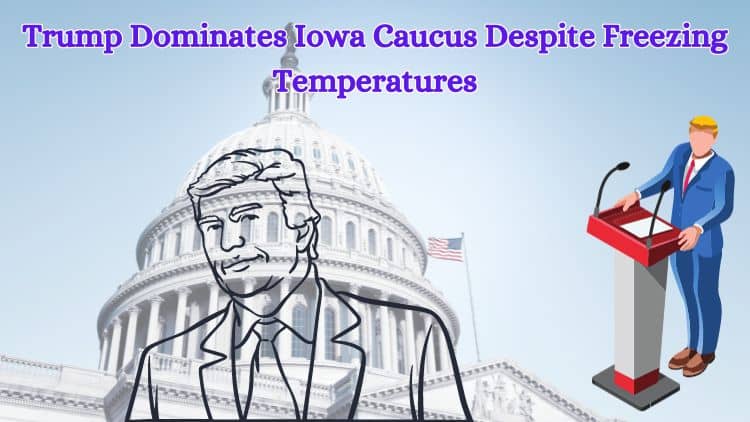“I think there was no suspense in the fact that Donald Trump did win Iowa. He won it with a narrow majority. But the big suspense was who was going to take second place. I do think that if Rhonda Santz, who had staked everything on Iowa, had finished third, it would have been very difficult to argue how he could have gone on. Now, I think he has some reason for hanging around in the race, but the question is, what role will he play going into New Hampshire?
New Hampshire is a very different state from Iowa, and, in particular, many of the candidates who do well in Iowa don’t tend to do as well in New Hampshire, with a very independent-minded electorate. Many voters come from outside the Republican Party, which is why Nikki Haley has been tapped to potentially challenge Donald Trump in the New Hampshire primary.
When you look at states further down in the calendar, such as South Carolina, which is Nikki Haley’s home state but nonetheless a very conservative state that should be a Trump state, and other states in the primary calendar, it does seem that Rhonda Sis has a chance to stick around. The challenge for him, though, I think, is one where his narrative, his campaign, is saying, ‘I’m really the only one who can go toe-to-toe against Donald Trump because I’m the only one who has support among conservative Republicans. That’s where my base of voters is.’ However, there’s no indication from the results tonight that those votes are in any way dissatisfied with Donald Trump. They rewarded him with a majority of votes in Iowa.”
Shifting Voter Dynamics: Impact on Ronda Santos’s Chances
“It’s very unclear. You know what his base is, in theory, right? A candidate like deSantis, who comes from the right, should be competitive. But in practice, those voters are really in lockstep for Donald Trump right now. I think that this Iowa electorate also speaks to the changing nature of the Republican Party. The Republican Party has realigned to become a party of the working class, a party of the non-college educated voter. Throughout rural Iowa, Trump is receiving over 60, in some cases 70, and in a few precincts, even 80% of the vote. That’s very difficult to compete with.”
Unraveling Donald Trump’s Voter Support: Working Class and Evangelicals
“I think it’s his attitude, right? You know, that was a real question surrounding him in 2016. But, you know, in particular, socially conservative and evangelical voters who make up a majority of the Iowa electorate, what they saw in Donald Trump was, you know, it wasn’t necessarily that they want somebody who is sitting in the pews right alongside them. So much as somebody who fights for their agenda and fights for their issues and can actually win on their issues. And I think, would say that, you know, particularly on the issue of Roe versus Wade, on appointing Supreme Court justices that overturned Roe versus Wade, he has delivered for that segment of the Republican party.”
Unraveling the Dynamics: Understanding the 2024 Trump Campaign Operation
I believe that the professionalization of the staff has significantly improved. In 2016, the Trump organization lacked the necessary organization for caucuses, resulting in a failure. The difference in 2020 is notable, mainly due to Trump’s presidential status, granting him access to experienced staff from the previous election. The current campaign is marked by a heightened level of professionalism compared to both 2016 and 2020.
FAQ on Ronda Santos’s Electoral Prospects and Donald Trump’s Voter Support Dynamics
1. Why is the second-place finish in Iowa crucial for Ronda Santos?
- The second-place finish in Iowa is crucial for Ronda Santos as it determines the trajectory of his campaign. If he had finished third, particularly after staking everything on Iowa, it would have raised questions about the viability of his candidacy.
2. What challenges does Ronda Santos face going into New Hampshire?
- New Hampshire poses a different electoral landscape, with an independent-minded electorate. The state tends to favor candidates different from those who perform well in Iowa. Nikki Haley, for instance, is seen as a potential challenger to Donald Trump in the New Hampshire primary.
3. Can Ronda Santos maintain momentum in states like South Carolina?
- Despite being Nikki Haley’s home state, South Carolina is seen as a conservative stronghold for Trump. Ronda Santos might face challenges in maintaining momentum, and the key question is whether he can resonate with conservative Republicans in states further down the primary calendar.
4. What is the narrative of Ronda Santos’s campaign, and how does it align with Iowa’s results?
- Ronda Santos positions himself as the candidate who can go “toe-to-toe” against Donald Trump, claiming support among conservative Republicans. However, the Iowa results don’t indicate dissatisfaction among these voters with Trump, as he secured a majority of votes.
5. How does the shifting voter dynamic impact Ronda Santos’s chances?
- Ronda Santos, coming from the right, theoretically should be competitive, but the Iowa electorate highlights the changing nature of the Republican Party. Trump’s support is deeply rooted in the working class and non-college-educated voters, making it challenging for Santos to carve out his base.
6. What factors contribute to Donald Trump’s strong support, particularly among evangelicals?
- Trump’s attitude and his commitment to fighting for socially conservative and evangelical issues have solidified his support. Voters appreciate his dedication to their agenda, notably on issues like Roe versus Wade and the appointment of Supreme Court justices.
7. How has the Republican Party realigned, and what challenges does it pose for candidates like Ronda Santos?
- The Republican Party has realigned as a party of the working class and non-college-educated voters. Trump’s overwhelming support in rural Iowa, receiving over 60-80% of the vote, presents a significant challenge for candidates like Ronda Santos trying to appeal to a different demographic.
8. What improvements have been observed in the Trump campaign’s professionalization?
- The Trump campaign has significantly improved its professionalization, especially in terms of organization. The shortcomings of 2016, where the organization lacked the necessary structure for caucuses, have been addressed. The current campaign exhibits a higher level of professionalism compared to both 2016 and 2020, attributed to Trump’s access to experienced staff and lessons learned from previous elections.

